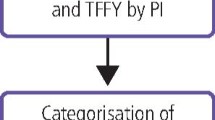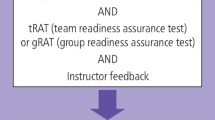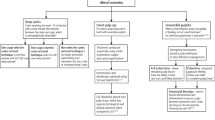Abstract
Data sources
PubMed, ERIC and PsycLIT. The database search was supplemented with manual search of the electronic archives of the following journals: Academic Medicine, Medical Education, Teaching and Learning in Medicine, Journal of Dental Education and European Journal of Dental Education. Further articles were retrieved from the reference lists of selected papers. The review covered the period 1976-2008.
Study selection
Studies were eligible if they presented original research using PBL in research settings compared with another educational method (at a whole curriculum level or as a single intervention). This review included both randomised controlled trials (RCTs) and comparative studies. Qualitative and quantitative designs were eligible.
Data extraction and synthesis
Three dental educators selected studies. It is not clear that there were predefined criteria. The studies showed considerable heterogeneity in their study designs, characteristics, outcome variables and results. A descriptive review of the data was presented.
Results
Sixty-nine studies were initially identified. The authors excluded 17 of these because they could not obtain full texts. Thirteen studies were excluded because they used purely qualitative data. Of the remaining 39 studies six were RCTs and 33 comparative studies. The RCTs gave little information about the curriculum design and used markedly different outcome measurements including test scores, personal characteristics and subjective approaches to learning and experiences. There was no overall difference in student performances between the integrated and the PBL curriculum but a significant difference in favour of these two when compared with a conventional curriculum. A modest advantage of PBL was noted in relational skills, humanistic attitudes and diagnostic accuracy. Test scores did not appear to be influenced by the use of PBL. Though PBL seems to have a good effect on several competencies after graduation no significant effects were observed in lifelong learning attitudes. Comparative studies on the whole showed a benefit from using PBL, for example in critical reasoning, problem solving abilities and creativity.
Conclusions
Some evidence exists that single PBL intervention in a traditional curriculum is an effective learning tool, though test results appear not to be affected.
Similar content being viewed by others
Log in or create a free account to read this content
Gain free access to this article, as well as selected content from this journal and more on nature.com
or
References
Albanese MA, Mitchell S . Problem-based learning: a review of literature on its outcomes and implementation issues. Acad Med 1993; 68: 52–81.
Vernon DT, Blake RL . Does problem-based learning work? A meta-analysis of evaluative research. Acad Med 1993; 68: 550–563.
Colliver JA . Effectiveness of problem-based learning curricula: research and theory. Acad Med 2000; 75: 259–266.
Dochy F, Segers M, Van den Bossche P, Gijbels D . Effects of problem-based learning: a meta-analysis. Learning and Instruction 2003; 13: 533–568.
Newman M . Campbell Collaboration Systematic Review Group on the effectiveness of problem-based learning. A pilot systematic review and meta-analysis on the effectiveness of problem based learning. Newcastle upon Tyne (UK): University of Newcastle upon Tyne, Learning and Teaching Support Network, 2003.
Koh G C-H, Khoo HE, Wong ML, Koh D . The effects of problem-based learning during medical school on physician competency: a systematic review. CMAJ 2008; 178: 34–41.
Winning T, Townsend G . Problem-based learning in dental education: what's the evidence for and against ... and is it worth the effort? Aust Dent J 2007; 52: 2–9.
Townsend G, Winning T . Research in PBL – where to from here for dentistry? Eur J Dent Educ 2011; 15: 193–198.
Norman G . RCT = results confused and trivial: the perils of grand educational experiments. Med Educ 2003; 37: 582–84.
Cook DA . Avoiding confounded comparisons in education research. Med Educ 2009; 43: 102–104.
Cook DA, Bordage G, Schmidt HG . Description, justification and clarification: a framework for classifying the purposes of research in medical education. Med Educ 2008; 42: 128–133.
Author information
Authors and Affiliations
Additional information
Address for correspondence: Dr Ioannis Polyzois, School of Dental Science, Trinity College Dublin 2, Ireland. E-mail: Ioannis.Polyzois@dental.tcd.ie
Polyzois I, Claffey N, Mattheos N. Problem-based learning in academic health education. A systematic literature review. Eur J Dent Educ 2010; 14: 55–64
Rights and permissions
About this article
Cite this article
Townsend, G. Problem-based learning interventions in a traditional curriculum are an effective learning tool. Evid Based Dent 12, 115–116 (2011). https://doi.org/10.1038/sj.ebd.6400829
Published:
Issue date:
DOI: https://doi.org/10.1038/sj.ebd.6400829



